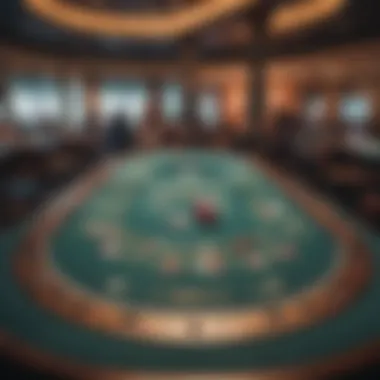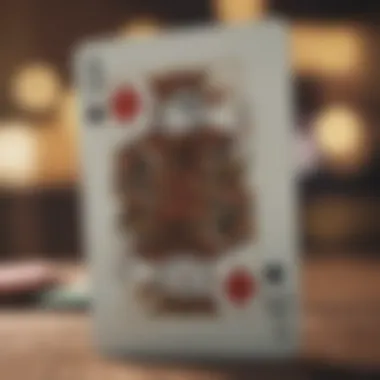Explore the Top Three Variants of Blackjack


Intro
Blackjack stands not just as a staple in gambling circles but as an intriguing puzzle that has captivated minds ever since its inception. The thrill of maximizing a hand total against the dealer's often creates a unique blend of luck and skill, enticing both novice players and seasoned strategists alike. As the game of blackjack evolved, several variants emerged, each bringing its own set of rules, strategies, and appeal.
Understanding these nuances can greatly influence your success at the table. Whether you are a casual player dipping your toes into the world of blackjack or a seasoned gambler on the prowl for new experiences, grasping the ins and outs of the top three variants can elevate your gameplay. Let’s embark on a journey to dissect these exciting versions and explore what sets them apart from traditional blackjack.
Overview of Blackjack
Blackjack stands as a cornerstone in the gambling world, captivating players for centuries. Understanding its basics is crucial for anyone looking to delve deeper into various strategies and variants. Knowing the historical context, fundamental rules, and the core game objective sets a solid foundation for exploring the major types of blackjack. It illuminates the broader narrative of gambling as a whole.
Historical Context
Going back to its roots, blackjack has a storied history that reflects cultural shifts and the evolution of gambling. The game likely originated in French casinos around the 1700s, where it was known as "vingt-et-un" or twenty-one. This classic game resurfaced in America during the 19th century and gathered a slew of unique rules along the way. Over time, casinos adopted a steeper set of rules to entice players, leading to the famous 21. Today, blackjack is played in many forms worldwide, each with its own charm and subtleties. The game's long-standing popularity speaks volumes about its ability to adapt and resonate with various audiences.
Fundamental Rules
At its core, understanding the fundamental rules of blackjack is key to mastering the game.
- Players aim to beat the dealer by having a hand total closer to 21 without exceeding it.
- A starting hand consists of two cards, and players can choose to "hit" (take another card) or "stand" (keep their current hand).
- Interestingly, aces can be worth either one or eleven points, which adds a layer of strategy to gameplay.
- If a player exceeds 21, they immediately "bust" and lose their bet.
Having a grasp on these rules not only sets the stage for better decision-making but also enhances the enjoyment factor as players navigate through their gaming experience.
Game Objective
The primary goal of blackjack is straightforward: beat the dealer, all while keeping within that magic number of 21. However, the subtleties involved often lead to complex strategies. Players must assess their hand and the dealer's showing card—whether to gamble on an extra card or stay put. Achieving a natural blackjack, which is an ace paired with a ten-value card, also turns the tables in a player’s favor quite significantly.
Essentially, the interplay between luck and strategic thinking defines the allure of blackjack. As players dive into the game, they must not only be mindful of their position but also recognize how external factors like house rules can alter their chances. Understanding these dynamics ultimately enhances the gambling experience, inviting players to explore different variants and their unique appeals.
Blackjack Variants Explained
Exploring the variants of blackjack is essential as it broadens players’ horizons beyond the conventional rules of the game. Variants can introduce new dynamics, distinct rulesets, and unique enough variations that they transform how blackjack is played and approached strategically. In this section, we will elucidate why these variants matter not just for entertainment but also from a strategic perspective.
Defining Variants
So, what’s a variant, you might wonder? In the simplest terms, a variant is a offshoot of the original game that brings in fresh rules or play styles. Think of it like a recipe modification—sometimes a pinch of something different can lead to an entirely new culinary experience.
Some of the fundamental variations in blackjack include European Blackjack, where players can only draw after the dealer's turn, and Spanish 21, featuring a unique deck of cards. Each of these variants not only modifies how the game is played but can also alter strategic decision-making processes.
It's essential for players to grasp these rules and mechanics not only to play but to adapt their strategies accordingly.
Importance of Variants in Gambling Culture
Variants serve much more than a mere entertainment purpose in gambling culture. They reflect regional preferences, shifting player demographics, and trends in gaming. For example, in some areas, a certain variant may be more popular, which creates a community around it.
Understanding variants allows gamblers to connect with different cultures and traditions in gaming practices. For instance, Spanish 21 isn't just about the cards dealt; it carries with it the essence of where and how it originated.
Additionally, a diverse range of blackjack variants can enhance player engagement. By offering something new, casinos turn a casual player into a more devoted enthusiast. Players exposed to multiple variants might find their preferences shifting, further broadening the audience base.
"The beauty of gambling lies not just in winning, but in exploring flavors of the game you never knew existed."
Take a moment to consider the impact on gambling trends. As more casinos introduce variants, this influences which games players gravitate towards. In a world where traditional games dominate, variants can spice up the landscape, igniting interest not only among seasoned gamblers but also newcomers looking to dive into the experience.
In summary, understanding blackjack's variants paves the way for strategic, cultural, and social enrichment, making it a topic worth delving into for anyone serious about the game.
Classic Blackjack
Classic Blackjack, often regarded as the cornerstone of the game, provides a foundation for understanding various blackjack variants. Its rules and structure have remained relatively unchanged over the years, establishing a core that players, both seasoned and novices, can easily grasp. This variant highlights the essence of gambling strategy, as it balances luck and skill in a way that few other games can. Recognizing the significance of Classic Blackjack not only enhances appreciation for the game itself but also prepares players to fully engage with its more complex cousins.
Rules and Gameplay Mechanics
The beauty of Classic Blackjack lies primarily in its straightforward rules. Each player tries to outscore the dealer by getting as close to 21 without going over. Players start with two cards, while the dealer has one face-up card and one face-down card, often referred to as the hole card. Players can choose to hit (take another card), stand (keep their current hand), double down (double the bet and take one more card), or split (divide two cards of the same rank into two hands).
One of the primary aspects of Classic Blackjack is the presence of the dealer's rule, which varies by casino but typically mandates that the dealer must hit until they reach a total of 17 or greater. This creates a natural tension between player strategy and dealer behavior, making each round unique. Additionally, a player Blackjack, which is an Ace paired with a ten-value card, usually pays 3 to 2, giving players an edge right at the start.
Strategy Tips for Success
To succeed in Classic Blackjack, players must familiarize themselves with basic strategy, a set of guidelines developed through statistical analysis to inform when to hit, stand, double down, or split. Here are some quintessential strategies:
- Always Stand on 17 or higher: Unless you're holding a soft 17 (an Ace and a six), don't risk hitting.
- Double Down on 11: There’s a good chance of hitting a ten or face card, giving you a strong total of 21.
- Split Aces and Eights: This allows the potential for two strong hands. On the other hand, never split tens or face cards, as the total of 20 is already quite strong.
Furthermore, keeping an eye on the dealer’s upcard is crucial. A dealer showing a weak card (2-6) is often a sign that it’s better to stand on lower totals, relying on the dealer to bust.


Common Player Mistakes
While Classic Blackjack appears straightforward, many players still stumble into frequent traps. Awareness of these can dramatically improve a player’s chances:
- Not Knowing Basic Strategy: Many players rely on gut feelings instead of strategy, leading to suboptimal decisions.
- Chasing Losses: This impulse can result in larger bets in hopes of recouping previous losses, often leading to bigger pitfalls.
- Getting Too Attached to Hands: Holding on to the idea of a strong hand, like a pair of eights, can blind players to better options — such as splitting.
"In any card game, it’s vital to keep your wits about you. Thinking rationally beats instinct every time."
By honing in on strategic gameplay and avoiding common missteps, players position themselves to not only enjoy Classic Blackjack but excel at it as well.
European Blackjack
European Blackjack stands out as a unique variant within the broader blackjack landscape. It's not just your run-of-the-mill card game. This variant introduces several distinctive elements that significantly alter gameplay, making it a favorite among enthusiasts. By diving into this section, players gain valuable insights into the game’s structure and the nuances that set it apart from its classic counterpart.
Distinctive Features
One of the primary characteristics that differentiate European Blackjack from other variants is the deal structure. While many variants, including Classic Blackjack, issue two hole cards to the dealer, European Blackjack only provides the dealer with one card face up initially. This singular feature creates a suspenseful atmosphere, keeping players guessing until the dealer reveals their hidden card. Furthermore, the game often uses multiple decks, which affects probabilities and strategic decisions.
Additionally, players can only double down on their initial two cards, not after splitting, which necessitates a more strategic approach from the outset. The lack of surrender option is another key difference, demanding that players adapt their strategies compared to games that allow this tactical retreat.
"In European Blackjack, strategic thinking is not just a skill; it's a necessity. Every decision matters, and the unique rules elevate the challenge."
Changing the Dynamics of Play
The dynamics of play in European Blackjack shift significantly due to these rules. With only one dealer card in view, players are often left to speculate on what the hidden card might be. This uncertainty heightens decision-making pressure. Players might feel compelled to adjust their strategies on the fly, perhaps leaning toward more conservative play styles until they gather enough information based on the dealer’s actions.
The change in dynamics also affects the pacing. Players have more time to consider their moves, which can lead to deeper strategic contemplation. With fewer opportunities to surrender, players often find themselves committed to a hand, leading to more intense gameplay, especially in high-stakes environments.
Strategic Adjustments Required
Understanding the need for strategic adjustments is critical for success in European Blackjack. Few things are as essential as grasping when to stand, hit, or double down based on the single dealer card displayed. Players must analyze their cards in relation to the dealer's up card and adjust their approach accordingly.
Here are some strategic considerations:
- Assess the Dealer's Up Card: If the dealer has a weak card (2-6), players might opt to play more aggressively, as the chances of the dealer busting increase.
- Careful Doubling Down: Since doubling down is restricted to the first two cards, it's crucial to only commit to it when holding strong cards (like 11) against weak dealer cards.
- Focus on Card Counting: While challenging due to the multiple-deck usage, some players still benefit from tracking high and low cards to inform their decisions on betting and drawing.
By modifying their strategies based on these distinctive rules and play style shifts, players can navigate European Blackjack with a greater degree of success. This knowledge empowers players to make informed choices, enhancing their overall gaming experience.
Spanish
Spanish 21 is a rapidly gaining popularity variant of traditional blackjack, distinguished by its own set of unique rules and gameplay elements. It captures the essence of blackjack while introducing features that keep even seasoned players on their toes. This variant is crucial as it presents a fresh perspective on the classic game, catering to diverse player preferences and adding depth to the gambling experience.
Overview of the Rules
Spanish 21 replaces the standard 52-card deck with a 48-card one, omitting all the tens. This alteration has significant implications for gameplay strategy and odds. Here’s a concise overview of its rules:
- The objective remains getting as close to 21 as possible without going over.
- Players receive two cards, while the dealer has one card face up and another face down.
- Players can double down and split pairs like in traditional blackjack.
- Surrendering is also an option, allowing a player to reclaim half their bet after the initial deal if they feel they are at a disadvantage.
- Notably, a natural 21 (an Ace plus a face card or ten) pays out 3:2, better than the 2:1 in classic blackjack.
Navigating these rules offers players the chance to customize their strategies and plays, making it essential knowledge for anyone venturing into Spanish 21.
Game Mechanics That Set It Apart
Several mechanics distinguish Spanish 21 and add to its appeal:
- Increased Bonuses: Unlike classic variants, Spanish 21 offers several bonus payouts for unique hand combinations, such as a five-card 21.
- Multiple Options for Doubling: Players can double down not just on their initial two cards, but also after splitting pairs, which adds layers to strategy planning.
- Dealer Rules: The dealer must hit on a soft 17, which impacts the probabilities and strategies players employ.
- Late Surrender: This mechanic allows for surrendering after the dealer checks for blackjack, providing added flexibility for players.
These features elevate the tension and excitement during gameplay, presenting opportunities and risks that players need to weigh carefully throughout each hand.
Strategic Benefits and Risks
Engaging with Spanish 21 involves careful strategizing. Here are some key benefits and risks:
- Benefits:
- Risks:
- Enhanced payout potential compared to traditional blackjack, especially with favorable hand conditions like a natural 21.
- Opportunities to exploit the game's unique rules for tactical advantages, particularly with splitting and doubling options.
- A greater chance to thwart the dealer's attempts to capitalize on typical blackjack trends, due to distinct game structure.
- The absence of tens in the deck can create a less favorable overall player hand in some situations, leading to potentially poorer hands compared to classic blackjack.
- Players unfamiliar with the mechanics might overlook opportunities for profit, leading to diminished success rates.
- Increased complexity in gameplay can overwhelm novices, causing them to make hasty decisions.
Understanding these strategic benefits and pitfalls is essential for anyone wishing to thrive in Spanish 21 and enjoy its uniquely engaging features while keeping astute, calculated decision-making at the forefront of their gameplay.
Comparative Analysis of the Variants
Understanding the comparative aspects of the different blackjack variants offers players a wealth of knowledge they're unlikely to find simply by jumping into the game without background. Each variant is distinct in its structure, rules, and player engagement, not to mention the ways they affect the overall house edge. This analysis brings clarity to the differences, allowing players to make informed decisions that align with their gaming preferences and risk tolerance. By diving into payout structures, house edge considerations, and player engagement, we can appreciate the subtle nuances each variant offers.


Payout Structures
The payout structure is a crucial element in distinguishing the variants of blackjack. Generally, traditional blackjack pays 3:2 for a natural blackjack, meaning if you bet 10 chips and draw an ace and a ten-value card, you’ll receive 15 chips in winnings. However, this is not the case across all variants. For instance, in Spanish 21, the base payout remains the same, but certain combinations might offer varying returns, like a 2:1 payout for a five-card 21 which doesn’t exist in classic blackjack.
Another variant, European Blackjack, also sticks to the traditional payout but introduces rules that can alter how a player perceives winning hands. Watch out for those quirky circumstances, as sometimes players might think they have a winning hand only to discover the payout isn’t as satisfying as traditional games.
Here are some key elements about payout structures:
- Classic Blackjack: 3:2 for blackjack.
- European Blackjack: Generally retains the 3:2 for standard wins.
- Spanish 21: Varies extensively, offers unique payout bonuses.
House Edge Considerations
The house edge is something that every serious player must consider. It’s basically the built-in advantage that the casino has in any game, and it varies significantly between blackjack variants, directly influencing a player's potential for sustained wins. In straightforward terms, players need to be on guard, as the variant they choose can dramatically change their statistical chances.
Classic blackjack generally has a low house edge of around 0.5% if played using basic strategy. In contrast, European Blackjack typically sits at a slightly higher edge of about 0.4% to 0.6%, thanks largely to its rules about dealer draws in certain situations.
Spanish 21 tends to have a much higher house edge, which can be anywhere from 0.5% to 1%, primarily based on the deck it operates with and the various rule nuances that entice players with bigger payouts but diminish long-term win potential. Players should keep a keen eye on:
- Classic Blackjack: ~0.5% edge.
- European Blackjack: ~0.4% to 0.6% edge.
- Spanish 21: ~0.5% to 1% edge.
"The house edge is like a shadow in blackjack; it lurks about, changing its shape depending on the variant you choose. Knowing where it hides helps in strategizing your approach."
Player Engagement and Experience
The player experience when engaging with different blackjack variants can be as different as night and day. The rules may seem similar, but the engagement factor shifts dramatically based on how the game alters traditional play. Players often find that variants like Spanish 21 offer a more dynamic playing experience due to its diverse strategies and rewarding payouts for creative plays.
European Blackjack, while close to classic, can feel somewhat restrictive, primarily due to its gameplay where players must endeavor with less information since the dealer doesn’t expose their hole card until all player actions are complete. This enhanced uncertainty can ramp up the tension but may also frustrate some players who prefer transparency.
On the other hand, Classic Blackjack’s straightforward immediate player-dealer dynamics could appear more comforting and easier to navigate for beginners or those preferring less complexity. Understanding how a variant shapes your gaming experience is crucial to enjoying the game, and here are a few points to ponder:
- Classic Blackjack: Straightforward, clear engagements.
- European Blackjack: Increased uncertainty heightens the experience.
- Spanish 21: Varied interactions and risk-reward dynamics keep it exciting.
In sum, a side-by-side look at these variants brings to light the distinct characteristics and strategies players should consider, ensuring they pick a type that not only suits their style but also maximizes their chances for success at the table.
The Role of Strategy in Each Variant
When it comes to blackjack, strategy isn't just an afterthought; it's the very backbone of gameplay. Different variants of blackjack offer distinct rule sets and dynamics, which in turn influence how players should approach their strategy. Understanding these strategic nuances can mean the difference between a casual game experience and a potentially lucrative one.
Basic Strategy Differences
Every variant of blackjack has its own specific rules, and this directly impacts the basic strategy that players should adhere to for optimal play.
- Classic Blackjack: Here, the dealer stands on all 17s. The basic strategy focuses on the player's total in relation to the dealer's upcard. For instance, a player would typically stand on a hard 17 or above but hit on anything lower when the dealer shows a 7 or higher.
- European Blackjack: This variant introduces a few modifications, such as the dealer only receiving one card initially. Thus, players must adjust their strategy accordingly—where they might have hit in Classic, standing could be a smarter option since the dealer’s hole card remains hidden until later on.
- Spanish 21: Unlike the other two, Spanish 21 removes the 10s from the deck, making it a different ballgame. Players should be ready to adapt their hitting and standing decisions based on the lack of ten-value cards. Additionally, Spanish 21 has unique rules that allow for more flexibility, such as late surrender and player 21 always winning.
In essence, while the core strategies share similarities, small rule variations can shift optimal plays significantly. Understanding these differences is crucial for any serious gambler.
Advanced Techniques and Considerations
Once players are grounded in the basic strategy for each variant, they can start looking into advanced techniques that deepen their gameplay experience.
- Card Counting: This technique is applicable more heavily in Classic and European variants. Players keep track of high and low cards dealt, shifting their strategy depending on the remaining deck composition. The goal is to increase bets when the odds tilt in their favor.
- Game Awareness: Each variant has distinctive rules that can alter card dynamics. For instance, Spanish 21 requires players to recalibrate their strategies when they realize fewer favorable cards exist in the deck. Gamblers must stay alert to different situations in each game.
- Bet Sizing: Tailoring bets for each variant can maximize winnings and minimize losses. For example, when playing European Blackjack, if you’ve successfully counted cards, you might increase your bet, capitalizing when the odds shift in your favor.
"Mastering strategy in blackjack variants is more about adaptability than rigid rules. A nuanced approach can keep an edge over the house."
Understanding these advanced strategies isn't just about winning more; it’s also about deepening the thrill of the game. Each variant of blackjack offers unique opportunities and challenges, making strategy an essential part of each player’s journey.
Tips for Players Choosing a Variant
Deciding which variant of blackjack to play can feel like looking for a needle in a haystack. With so many options on the table, the choice might seem daunting at first. However, understanding your preferences and skill level can make the process smoother than a well-shuffled deck.
Evaluating Personal Preferences
Before you put your chips down, take a moment to reflect on what you enjoy in a game. Are you in it for the thrill of the chase, or do you prefer a more leisurely experience? Different blackjack variants can cater to different tastes. For instance, Classic Blackjack is straightforward and traditional, making it a solid choice for those who appreciate time-tested rules. On the other hand, Spanish 21 offers a twist that could engage players eager for something outside the norm.
Another aspect to consider is the pace of the game. Some variants, like European Blackjack, may advance at a different rhythm than others. If you prefer a rapid-fire session, you might want to shy away from variants that allow for more complex strategies and decision-making.
Being cognizant of the atmosphere is equally important. Are you looking to play in a lively casino setting or prefer the comfort of online gaming? Your environment can significantly affect your enjoyment.
Assessing Skill Levels
Skill can be a game-changer when picking a blackjack variant. If you’re just starting and still feeling your way around the rules, sticking to Classic Blackjack could be the best approach. Its simplicity allows you to grasp the basic strategies without feeling overwhelmed.


For seasoned players, diving into more advanced versions like Spanish 21 might be appealing. This variant requires a deeper understanding of strategies and odds, providing a more stimulating challenge.
Ask yourself what you want from the experience: a relaxing game where you can gradually build your skills or a more intense environment where strategic thinking will be put to the test? Also, consider how comfortable you feel with the mathematical aspects of blackjack. If calculating odds makes your head spin, opting for a simpler variant might be wise.
Choosing the right blackjack variant can significantly enhance your gaming experience. Take your time, analyze your preferences, and be honest about your abilities. The better you understand yourself as a player, the more satisfying your gaming experience will be.
"The most important thing in gambling is honesty. Honesty with oneself, and honesty with the game."
Cultural Impact of Blackjack Variants
Understanding the cultural impact of blackjack variants provides invaluable insight into how these games are woven into the fabric of society. The simple gameplay and strategic elements of blackjack resonate differently across cultures, reflecting local traditions and gambling practices. Each variant not only captivates players but also creates unique social environments, shaping how communities engage with gaming.
Cultural Significance in Different Regions
Blackjack's variants have carved distinct identities in various cultures. In Spain, Spanish 21 stands out due to its cultural melding of traditional Spanish gaming customs with modern blackjack. Here, the removal of tens from the deck strikes a chord with players, reflecting a conscious choice to slightly alter a familiar game.
In comparison, European Blackjack enjoys a reputation that aligns closely with high-stakes gambling in opulent casinos. Its rule adaptations, such as the dealer standing on soft 17, appeal to those who relish a more strategic, elegant gambling experience. This variant has seeped into popular culture, influencing how blackjack is perceived globally, often depicted in movies or high-brow casino literature.
Players often connect with these games on a personal level, sharing stories about their experiences and strategies. This cultural significance translates into social gatherings where variant preferences reveal more than just gaming skills; they unveil regional pride and community bonding.
Influence on Gambling Trends
The evolution of blackjack variants is closely tied to emerging trends in the gambling world. As players seek new experiences, the variants have adapted to market demands. Online gambling has propelled this shift, enabling a broader audience to engage with different versions without the confines of a physical casino. Sites offering live dealer games have integrated variants like European Blackjack and Spanish 21, making them accessible to novice and veteran players alike.
This shift is not just a matter of convenience but also reflects changing attitudes towards risk and reward in gambling. As strategies evolve, players start to gravitate towards variants that suit their strategic preferences, leading to more informed choices about their gaming experience.
"Players often find themselves drawn to variants that not only challenge their skills but resonate with their cultural identities, transforming the simple act of playing into a profound experience."
Collectively, the unique attributes of these variants drive player engagement and foster community around shared interests. Gamblers become not just players but active participants in a gambling culture that celebrates diversity, strategy, and the joy of the game.
Future of Blackjack Variants
As the world of gambling continually evolves, so does the realm of blackjack. Understanding the future of blackjack variants is not just about recognizing trends but also about anticipating shifts in player preferences and game design innovations. This section dives into emerging alternatives and what might drive the next wave of blackjack games, shedding light on possible opportunities and challenges that await players and casinos alike.
Emerging Variants and Innovations
In the past few years, blackjack has seen a surge in creativity, thanks to technological advancements and a growing appetite for engaging gameplay experiences. Emerging variants are making a splash in online and brick-and-mortar casinos. For instance, games like Blackjack Switch introduce a unique twist where players can switch the second cards between two hands, adding layers of strategy. Another notable example is Super Fun 21, which allows for more freedom in terms of payouts for specific hands, enticing players looking for better rewards.
The blend of traditional mechanics with new rules creates a melting pot of possibilities. Here are just a few notable innovations worth keeping an eye on:
- Live Dealer Blackjack: This variant connects online players to real dealers through streaming technology. The real-time interaction mimics the feel of being at a physical table.
- Progressive Jackpot Blackjack: Players can wager a small additional amount for a chance at a jackpot that grows with each game played, attracting those with a taste for larger risks.
- Virtual Reality Blackjack: This immersive experience is still in its infancy but promises to revolutionize how players interact with the game by creating a fully virtual casino experience.
These variants not only cater to diverse player interests but also push the envelope in how the game can be experienced. As technology continues to enhance gameplay, players may see even more variants that bring unique elements to the table.
Predictions for Player Preferences
Gambling trends are akin to the tides; they shift and change based on various factors. The preferences of players are no different. Given the emergence of more innovative blackjack variants, it stands to reason they will significantly shape future gameplay choices. Players might gravitate toward options that offer not just entertainment but strategic depth.
Predictions suggest a few key preferences:
- Emphasis on Interactivity: With the rise of live dealer games and interactive online platforms, players will likely seek variants that enhance engagement through social elements.
- Desire for New Experiences: As the gambling landscape becomes more saturated with identical offerings, players might flock towards variants that promise something fresh and unique.
- Focus on Accessibility: The online gambling scene is booming, and there's a general expectation that players enjoy the convenience of playing from home, further pushing the popularity of online-exclusive variants.
Gamblers are becoming ever more sophisticated in their choices and preferences. By keeping an eye on these predictions, operators can better tailor their offerings to align with what players desire, potentially increasing both participation and satisfaction.
"The only way to have a great gaming experience is to embrace change and innovation, much like blackjack variants are doing today."
As we look to the future, it’s clear that the landscape of blackjack will keep evolving, and understanding these shifts is essential for enthusiasts aiming to maximize their experience.
Final Considerations for Gamblers
In the world of gaming, where decisions hinge on strategy and probability, making informed choices ultimately shapes a gambler’s experience and success. Understanding the implications of the game you choose—especially when diving into variants like Classic Blackjack, European Blackjack, and Spanish 21—can not only enhance your gameplay but also affect your satisfaction and potential returns. As gamblers, it’s essential to take time to reflect on your experiences and draw conclusions that align with both your skills and goals.
Making Informed Choices
When assessing which blackjack variant suits your style, knowledge is power. Here are some critical factors to consider:
- Understand the Rules: Each variant has its unique rules that influence gameplay. If you’re accustomed to Classic Blackjack, jumping into Spanish 21 without grasping its nuances may leave you at a disadvantage.
- Player’s Skill Level: Evaluate where you stand in terms of skill. New players might prefer the straightforward mechanics of Classic Blackjack, while seasoned gamblers may enjoy the depths of strategy involved in European Blackjack.
- House Edge: It’s worthwhile to research the house edge for each game. Generally speaking, a lower house edge increases the player's chances over time. For instance, European Blackjack often has a slightly lower house edge compared to its classic counterpart.
- Limit Your Losses: Set clear limits before engaging in any game. This involves knowing how much you’re willing to lose and stopping when you hit that threshold. Emotional decisions often lead to mistakes, so keeping a cool head is vital.
"The best gambler is the one who recognizes that sometimes it’s best to fold rather than play on when the odds are not in their favor."
Knowing when to walk away is as crucial as understanding the game rules. Ensure you are informed, disciplined, and ready for your chosen variant.
Understanding Risk and Reward
Gambling inherently carries risks, but understanding those risks in relation to potential rewards is what separates savvy players from the rest. Here are some things to consider:
- Reward versus Risk: Higher stakes games could lead to greater rewards, but they also come with greater risks. For example, while Spanish 21 might offer more attractive payouts on certain hands, its complex rules may increase the risk of missteps.
- Probability and Payouts: Knowing the probabilities inherent to each variant allows you to gauge whether potential payouts are worth the risk. Familiarize yourself with optimal playing strategies to maximize returns.
- Emotional Factors: Recognize how emotions can sway your decisions at the table. A great run can lead to overconfidence, while a losing streak might force you into desperate plays. Evaluate not just the odds, but also mental and emotional aspects of your play.
Engaging with blackjack variants is as much a journey in mastering game dynamics as it is about managing risk versus reward. By prioritizing thoughtful decisions and maintaining a clear understanding of the unique aspects of each game, you equip yourself for success, ultimately enhancing your experience in the vibrant world of blackjack.



